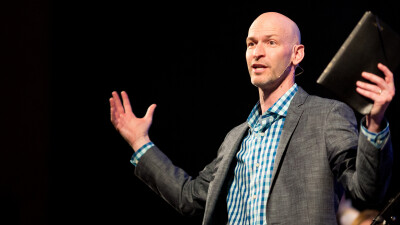This past Sunday, we had a more interactive “message” around the topic of money, giving, & stewardship. Matt Ulsas, David Weir, and I took questions from the congregation that were texted in. We covered as many as we could in the worship service. We’ll take the next few blog entries to respond to the remainder of the questions that were submitted. Email or for further dialogue.
Moving beyond the tithe, when do we save too much and should give it away? After the tithe, emergency fund, debt are paid off. I feel guilty saving beyond retirement when kids are hungry.
This is the process of determining what your finish line looks like or determining how much is enough. Ultimately your financial plan will help you determine this. If you have amassed enough money to provide for your future and your goals have been met, you need to start setting some kingdom goals! The caution in Luke 12 is to avoid building bigger barns just to build bigger barns. Pray and see how God wants to use your resources to store up treasurers in heaven (Matthew 6).
Does the church have resources to help those below the poverty line?
Yes, the church maintains a benevolence fund that is used to help families/individuals in need, both inside and outside the church family.
On the giving website, you can give with the checking account vs credit card. Is it OK to use credit card to take advantage of cashback feature of credit card?
For the church to receive the maximum benefit from your gift, it’s better to setup an auto withdrawal from a checking/savings account. This allows the 3% that would go to credit card fees to be used for Kingdom work.
My husband does not understand tithing. He is the primary “breadwinner” and does not give very much and certainly not with joy. I am to honor and respect my husband, but how do I do that and follow God’s direction to tithe?
This can be very difficult. If both spouses are Christians, but one is resistant to giving, then maybe a good step would be to look for opportunities, such as a stewardship class at church, where you would both be willing to participate and giving is addressed. This would prevent the issue from being spouse vs. spouse. You can also pray for his heart to change. If he is reluctant to give money back, there is a greater issue going on in his heart that the Spirit will need to breakthrough and bring the change you long to see.
Is the 10% just to the church? Or is giving to other charitable organizations counted?
The first priority is to support the local church where you are receiving your primary care and spiritual support. This should account for a bulk (if not all) of your tithe. Giving to other charitable organizations would fall into the category of “special gifts and free-will offerings”, above and beyond the tithe (Deuteronomy 12:6-7).
I give nearly all of my 10% through my job as a teacher to poor and very needy inner city school kids who don’t have basic needs for school. How do I balance this giving with the needs of Eagle Church and my responsibility to give to my local church?
Supporting other charitable organizations, especially those to which we have an affinity towards, can be a great blessing for the giver and the organization. But those gifts should be above & beyond your support to the local church where you receive your primary spiritual care and development. Incidentally, as the local church is strengthened financially the overall gifts to the poor, marginalized, widow, orphan…etc. is increased.
Does the church prefer lump sums or steady weekly gifts?
A steady/consistent giving pattern is what we’re instructed to follow (see 1 Corinthians 16:1-2). The “lump sum” gifts or “catch up” gifts are certainly better than not giving but a consistent giving pattern allows the church leadership to steward the dollars to maximize ministry month-to-month.
